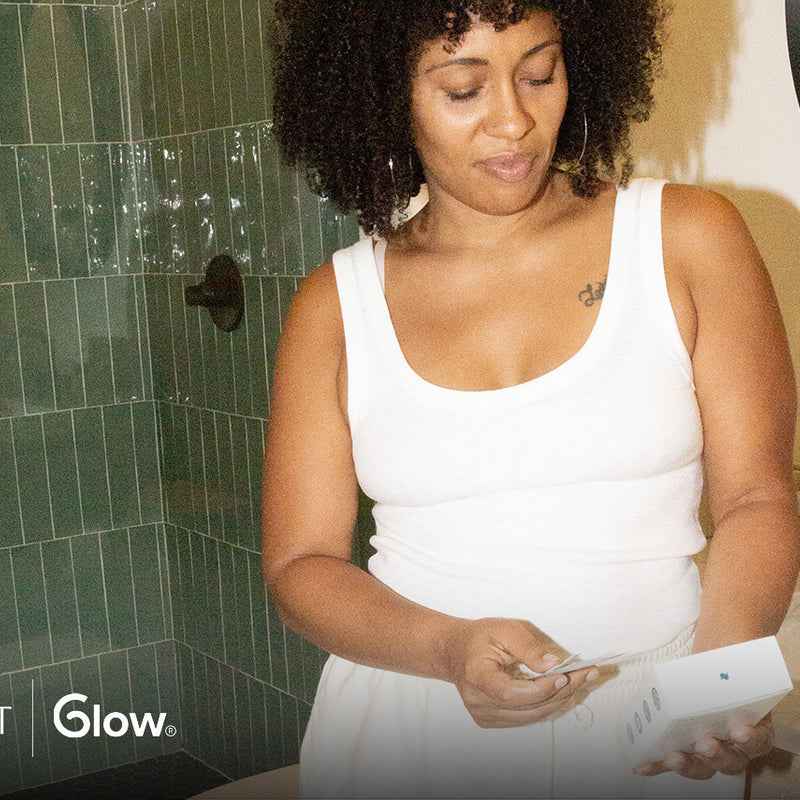Do You Ovulate On Birth Control?

Originally published 01/05/2023. Updated for accuracy and relevancy on 09/29/2023
Do you ovulate on birth control? Read on to learn more about how birth control impacts ovulation.
By OBGYN Dr. Kenosha Gleaton
In case you need a quick refresher— ovulation refers to the release of an egg from the ovaries about two weeks before menstruation. This is around the ideal time to try and conceive, AKA the fertile window, or if you’re not trying to conceive, the ideal time to stay on top of your birth control.
How Do I Know If I’m Ovulating?
So how can you tell if you are ovulating? If you’re one of the lucky ones with a regular menstrual cycle, you can probably use a calendar to help you figure out when you’re ovulating. Ovulation occurs on day 14 during a 28-day menstrual cycle, although cycles differ greatly so this isn’t always the case. Luckily there are ovulation tests that can help you track ovulation and confirm that ovulation is happening by detecting luteinizing hormone (LH). Ovulation can also cause some physical symptoms, including an increased basal body temperature (BBT), a change in cervical mucus, and even symptoms such as ovulation pain or painful breasts. Have more questions about ovulation? Visit the Natalist blog to learn more.
An Overview of Birth Control
Birth control is used to prevent conception, which can occur by preventing ovulation or by preventing sperm from reaching an egg. There are many different types of birth control, including:
Hormonal Birth Control
Hormonal methods release, well, hormones, such as estrogen and progestin, or in some cases, just progestin. Hormonal methods include the well-known combination birth control pill, the mini pill, birth control patch, vaginal ring, Depo-Provera shot, hormonal IUDs, and implant. [1] Hormonal methods work by preventing ovulation or otherwise making it difficult for implantation to occur by altering uterine conditions. [1] This can be done by keeping the uterine lining thin and changing the cervical mucus to prevent sperm from efficiently making it into the uterus. There is also a non-hormonal IUD made with copper that works similarly to hormonal methods, by changing the conditions of the uterus and cervical mucus while repelling sperm. [1]
Barrier Contraceptive Methods
Condoms are the most used and widely known barrier method, which works by blocking sperm from reaching the uterus. There are male (external) condoms and female (internal) condoms, as well as other barrier methods like spermicide, sponges, cervical caps, and diaphragms. [2]
Sterilization
Permanent surgery to prevent pregnancy is known as sterilization. This can be done on females, which is known as a tubal ligation, or on males, which is known as a vasectomy. [1]
Natural Family Planning
There is also a way of preventing pregnancy through natural methods, which is known as natural family planning or fertility awareness. This is done by timing sex around ovulation, using methods like ovulation trackers, tracking body temperature and cervical mucus, or lactational amenorrhea, which is when ovulation is suppressed during breastfeeding for up to six months. [3] If you’re interested in a natural family planning method, you should know that typical use is about 76% effective, much lower than other contraceptive methods. [3]
Does Birth Control Stop Ovulation?
Now that we’ve reviewed our birth control methods, let’s talk about how ovulation plays a role. In order to ovulate, the body needs to produce follicle-stimulating hormone (FSH) and luteinizing hormone (LH). [4] These are released prior to ovulation and work to develop and mature ovarian follicles that will eventually release a mature egg to be (potentially) fertilized.
After a follicle has done its job of developing and releasing an egg, estradiol and progesterone are released to let the body know it can stop producing FSH and LH. [4]
This is where birth control methods come into play. As we discussed, hormonal methods use estrogen and progestin (a synthetic form of progesterone) or sometimes just progestin, which can prevent ovulation from happening as well as change the conditions of the uterus and cervical mucus to be inhabitable for sperm. So, the short answer is that yes, some birth control methods stop ovulation from happening, but not all of them do. [1,4]
Which Birth Control Stops Ovulation?
- Combined oral pills
- Vaginal ring
- Patch
- Injectable (Depo-Provera)
- Implant
These contraceptive methods use hormones to effectively stop ovulation from occurring every month. [1,4]
Birth Control That Does Not Stop Ovulation
- Barrier methods
- Copper IUD
- Hormonal IUD
- Sterilization procedures
These contraceptive methods do not stop ovulation as they do not interfere with the body’s natural hormone release cycle. [1,2,4]
Additionally, there are some forms of birth control that stop ovulation in some users, but not all. These include:
- Mini-pill (progestin only pill): Found to inhibit ovulation in about half of users. [5]
- Hormonal IUDs: Up to 63% of users may continue to ovulate with hormonal IUDs. [6]
It’s important to note that in order for birth control methods to be reliable, users must follow instructions exactly as listed. All of this said, none of us are perfect, and perfect use sometimes just isn’t possible. Sometimes we forget our pills, pick up our prescriptions late, or forget to bring what we need on vacation. If you miss a few pills consecutively or have otherwise imperfect use of your birth control method, there is some risk that you could ovulate. Studies show that the risk is fairly low, but if you’re wanting to avoid pregnancy, be sure to use a backup method. [7] And remember, always follow instructions as closely as possible and talk with your healthcare provider about specific concerns.
Are There Risks With Long Term Birth Control Use?
It may sound extreme to not ovulate for months or years while on birth control, but the truth is there is little evidence to suggest that long-term use of hormonal contraceptives is bad for you! Studies have shown no increased cancer incidence or mortality due to contraceptive use, and research shows that the minimal risk of cardiovascular diseases or conditions from contraceptive use does not increase over time. [8-9]
Fertility is another concern for many birth control users, and I’m happy to report that many studies have concluded that birth control use doesn’t have a negative effect on fertility. [10] Find out when you can actually conceive after stopping birth control here. In general, though, you’re likely to ovulate the weeks after stopping birth control for most hormonal methods other than the shot, which may take up to 10 months for ovulation to restart. So, birth control is safe for long-term use!
Side Effects of Birth Control
Hormonal birth control, while safe, is known to cause some side effects in users. For many, these side effects are minimal or go away on their own, or switching to a different form of hormonal birth control can help alleviate side effects. Symptoms you may experience include:
- Weight gain or weight loss
- Nausea or vomiting
- Cramping or bloating
- Diarrhea or constipation
- Appetite changes
- Mood changes
- Acne
- Spotting
- Changes in menstruation
- Breast tenderness
- Risk of serious conditions, including cancer, cardiovascular disease, and tumors.
- Some people are at a higher risk for these serious conditions, your doctor can talk to you more about your risk factors
Key Takeaways
- Ovulation is the release of an egg from an ovarian follicle, which occurs every month about two weeks before menstruation.
- Ovulation is caused by the body releasing two hormones, follicle-stimulating hormone and luteinizing hormone.
- You can tell if you’re ovulating by using ovulation tests, tracking changes in your body, using a calendar, or observing symptoms of ovulation.
- There are a few different methods of birth control, including hormonal methods, barrier methods, sterilization, and natural family planning.
- Hormonal methods such as the birth control pill, patch, ring, shot, and implant, are known to stop ovulation.
- Some hormonal methods like the mini-pill and hormonal IUDs do not stop ovulation in all users but are still effective at preventing pregnancy by changing the uterine and vaginal conditions.
- It does not impact fertility or overall health to use contraceptives long-term.
- Some hormonal birth control methods may cause side effects, including nausea, weight changes, mood changes, and more.
References:
- Bansode OM, Sarao MS, Cooper DB. Contraception. [Updated 2023 Jul 24]. In: StatPearls [Internet]. Treasure Island (FL): StatPearls Publishing; 2023 Jan-. Available from: https://www.ncbi.nlm.nih.gov/books/NBK536949/
- Barrier Methods of Birth Control: Spermicide, Condom, Sponge, Diaphragm, and Cervical Cap. FAQ022. American College of Obstetricians and Gynecologists. April 2022. https://www.acog.org/womens-health/faqs/barrier-methods-of-birth-control-spermicide-condom-sponge-diaphragm-and-cervical-cap
- Smoley, B. Robinson, C. Natural Family Planning. Am Fam Physician. 2012;86(10):924-928
- Cooper DB, Patel P, Mahdy H. Oral Contraceptive Pills. [Updated 2022 Nov 24]. In: StatPearls [Internet]. Treasure Island (FL): StatPearls Publishing; 2023 Jan-. Available from: https://www.ncbi.nlm.nih.gov/books/NBK430882/
- Progestin-Only Pills. CDC. Division of Reproductive Health, National Center for Chronic Disease Prevention and Health Promotion. March 2023. https://www.cdc.gov/reproductivehealth/contraception/mmwr/spr/progestin.html
- Yoost J. Understanding benefits and addressing misperceptions and barriers to intrauterine device access among populations in the United States. Patient Prefer Adherence. 2014;8:947-957. Published 2014 Jul 3. doi:10.2147/PPA.S45710
- Zapata LB, Steenland MW, Brahmi D, Marchbanks PA, Curtis KM. Effect of missed combined hormonal contraceptives on contraceptive effectiveness: a systematic review. Contraception. 2013;87(5):685-700. doi:10.1016/j.contraception.2012.08.035
- Hogue CJ, Hall KS, Kottke M. Hormonal Contraceptives Improve Women's Health and Should Continue to Be Covered by Health Insurance Plans. Ann Intern Med. 2017;167(9):666-667. doi:10.7326/M17-2011
- Peterson HB, Lee NC. Long-term health risks and benefits of oral contraceptive use. Obstet Gynecol Clin North Am. 1990;17(4):775-788.
- Mansour D, Gemzell-Danielsson K, Inki P, Jensen JT. Fertility after discontinuation of contraception: a comprehensive review of the literature. Contraception. 2011;84(5):465-477. doi:10.1016/j.contraception.2011.04.002
Reach Out, We're Here
Have questions about your order or products? For the speediest answer, check out our FAQ section. Need something else? Come find us below.
Please keep in mind our regular business hours; Monday-Friday, 9am-5pm CT.
Customer Support
support@natalist.com
Press Inquiries
media@everlyhealth.com
Business & Partnerships
team@natalist.com
Affiliates + Influencers
team@natalist.com
Job Openings
Careers Page

























